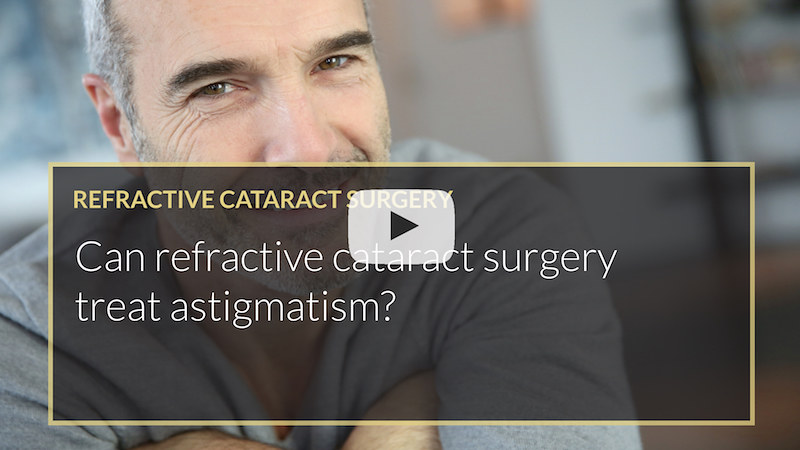Keratoconus - what is it?
Keratoconus is an eye condition in which your cornea gets thinner and bulges outward like a cone.
Keratoconus usually affects both eyes, although at differing points of onset and rates of progression.
In most people, keratoconus begins during their teenage years and progresses at varying rates until stabilising in their 30s or 40s.

Keratoconus causes
Keratoconus arises because of weakness in the layers of the cornea that leads to progressive thinning of the cornea.
Normal pressure within the eye causes the cornea to bulge into a cone-like shape progressively. This makes the eye more myopic and induces astigmatism (think of the cornea becoming shaped more like a rugby ball than a football). When this happens, you may notice blurring of vision and more frequent changes in spectacle prescriptions.
Normal activities, such as driving and reading can be challenging to perform.
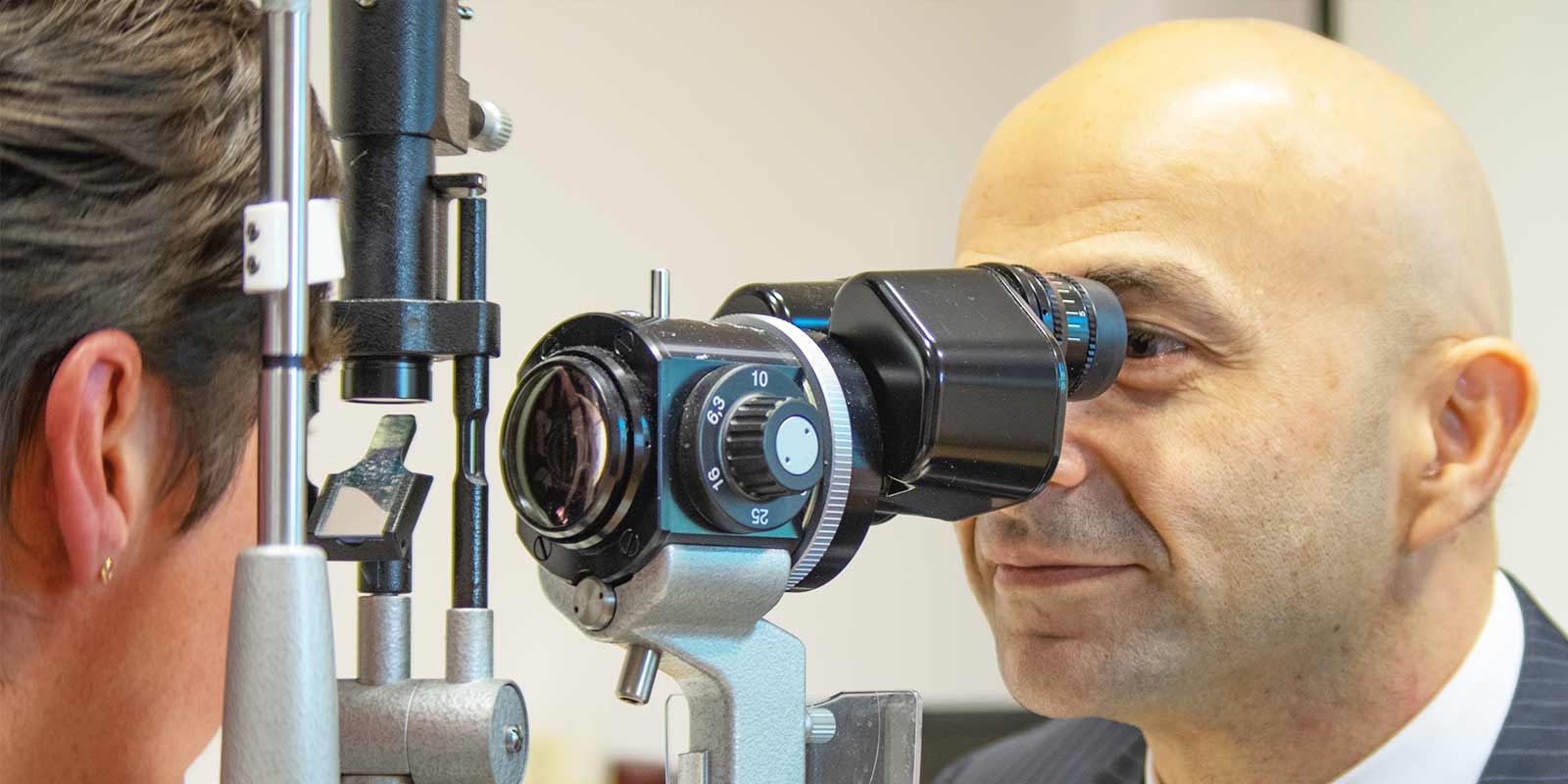
Keratoconus diagnosis
We can diagnose and examine keratoconus by performing a comprehensive eye examination.
The tests include:
- Eye refraction
- Slit-lamp examination
- Keratometry
- Computerised corneal mapping
Keratoconus treatment
Treatment of keratoconus is aimed at stabilising corneal shape and improving vision.
The correct treatment for your eyes depends on many factors.
A full consultation with Prof Muhtaseb will be required to establish the precise clinical need and most appropriate care plan to produce the best outcome.
Keratoconus is typically treated with contact lenses to improve vision. A proper lens fit is crucial to obtain adequate vision and wearing comfort. Poorly fitting or outdated contact lenses can be uncomfortable and lead to significant discomfort, corneal abrasions, scarring or infection.
If traditional methods aren’t possible, the interventions described below are successful in a high proportion of patients.
When the corneal shape is only mildly affected in early keratoconus, and the vision is still good, CXL can slow down or halt progressive distortion of the cornea by increasing its strength. It may also be possible to perform CXL in more advanced cases of keratoconus if the cornea is not too thin and the best corrected vision is still reasonable.
Watch this video on the Cross Linking.
INTACS inserts are clear, thin prescription inserts placed in the periphery of the cornea during a brief procedure. INTACS inserts reshape the curvature of the cornea from within.
When the corneal shape is more distorted, and the vision is reduced, ICRS can reshape the cornea and restore vision by improving the chance of success with a contact lens.
Watch this video on the Intrastromal Corneal Ring Segments (ICRS).
When the corneal shape is stable, corrected vision with glasses is good, and there is a desire to reduce dependence on glasses, then ICL phakic lens implantation can provide functional visual rehabilitation. NB: this is an off-label treatment.
ICRS + CXL
In some cases, there is a need to reshape the cornea and increase corneal strength. This produces a normalisation of corneal shape that is long-lasting and stable.
Additional ICL
When the cornea has undergone reshaping and become stable, ICL implantation can complete the visual rehabilitation by improving functional vision.
Corneal transplantation
Although keratoconus rarely results in blindness, 20% of all patients may at some time need to undergo a corneal transplant if the condition is left untreated. This can be either because of corneal scarring that prevents useful vision or because of intolerable side effects related to the use of contact lenses.
A corneal transplant, either full- or partial-thickness, can restore corneal clarity and improve vision.
However, corneal transplantation is a major undertaking with prolonged recovery time. Although the final result is often favourable in keratoconus, it should be considered a last resort.
Keratoconus - Frequently Asked Questions
Keratoconus can be seen in isolation, or it may be associated with some medical conditions such as asthma, eczma, hay fever, Down syndrome, and others
No, keratoconus cannot be cured in terms of reversing the corneal changes. However, collagen cross-linking can strengthen the cornea and slow down that changes of keratoconus.
Vision can be improved by using glasses, but if these don’t work then a specialist contact lens specially designed to fit over a conical cornea may provide a good improvement in vision.
No, keratoconus generally stabilises by the time a patient enters their 40’s. However, the corneal changes that can occur in the meantime may be quite severe and cause a serious reduction in vision.
Therefore, it is important to seek a consultation with a consultant ophthalmologist with a special interest in keratoconus for advice on possible treatment options.

Download our cataract guide
Most people have cataract surgery without knowing about all the options they actually have surrounding cataract surgery. Unfortunately, most people only find this out after having cataract surgery. The information in this Wales Cataract Guide could save you frustration and worry. Simply click the button below to give us your email and we’ll send you this life changing guide:
When might you need our treatment?

You’re over 45 and would love to read again without glasses
Unfortunately, reading glasses or varifocals get in the way of many of the things you most enjoy. Yes, spectacles help, but they are annoying little appendages that you lose or must clean to see clearly.
If you feel annoyed, anxious and limited by reading glasses or varifocal spectacles, we can help. Don’t let your favourite hobbies become tiring chores.
Be free from reading specs for good. Experience the liberation from squinting and headaches that you might have already begun to accept as part of life.
Instead, look forward to enjoying everything that your vision has to offer. Whether you enjoy reading, gardening, or the great outdoors, everything looks better when your eyes see as young as you feel.
Get a new lease on life. Contact us today and take the first step towards a better life.

Your vision is yellowing, duller, and cataracts are forming. You feel like your eyes are letting you down
The effect on your life can vary from being slightly frustrating, through to significantly affecting your ability to function independently, or even causing a devastating reduction in vision.
Before you developed cataracts, you were living a full life. You may enjoy the outdoors, have indoor hobbies or enjoy travelling. Or, perhaps you have finished working and are now taking the time to enjoy everything you may have missed when you were busy making a living.
Sadly, your eyes now dull the shine of life’s beautiful landscape. The trees, the flowers and even the sky don’t seem as bright as they used to look.
Get your life back without the compromise. Experience what life used to look like. Even better, if you’ve worn glasses or contact lenses, discover the incredible once-in-a-lifetime opportunity that modern cataract surgery affords.
Enjoy a life free from cataracts, glasses and contact lenses in three easy steps

Talk to us
Request your consultation online or call us on 02922 550 201 and we’ll guide you towards an initial assessment.
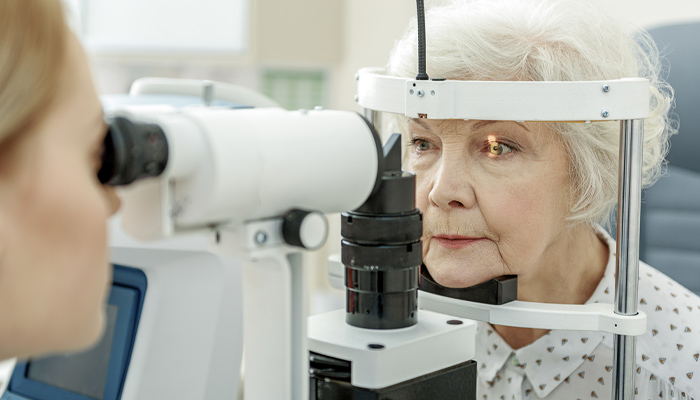
Meet your consultant
I’ll see you before treatment to ensure you’re a good candidate and treat you at one of my facilities in South Wales or Bristol.

Revitalise your eyes
I’ll supervise your aftercare as you begin to experience a life free of cataracts and glasses and contact lenses.
Patient stories
With over 6300+ surgeries performed hear from just a few of my happy patients.
It’s been incredibly liberating to wake up in the morning and be able to see without reaching for my glasses.
I can go any anywhere and see anything near and far. I can see now as well as I could when I was 18 years of age which is incredible and I’m looking forward to clear vision for the rest of my life.
“No. 1 – My advice would be do it. No. 2 – See Mohammed if you can. I made the decision to not go down the NHS route because I wanted to see the best consultant – probably in the UK… It was absolutely worth it… because you can’t really put a price on your sight.”
“I don’t wear glasses at all now. I don’t need them. I was impressed by his professionalism, his calmness. He explained everything clearly and in layman’s language… I would say to anyone considering treatment: just do it. Don’t be afraid of it. It’s painless and it works.”
“I can’t speak highly enough of (Prof Muhtaseb). Nothing was too much trouble, you could phone anytime, day or night. I wish I had done it when I first started wearing reading glasses and just gone to Prof Muhtaseb then and got it done. I would do it all over again, but do it much faster.”
“I would definitely recommend the professor. I think his approach is perfect! If you have any anxieties at all – just check with someone who’s had the procedure done. I had no pain at all. I expected a little bit of discomfort – but no pain, that was good. It’s life-enhancing and that’s not something you can put clearly enough. I didn’t realise how green the trees were! It’s lovely!”
We are proud to be a part of these professional bodies
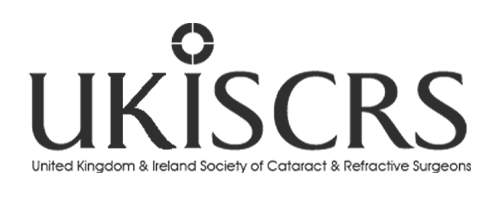

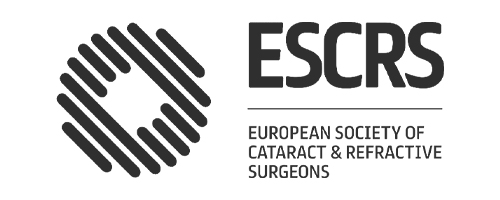


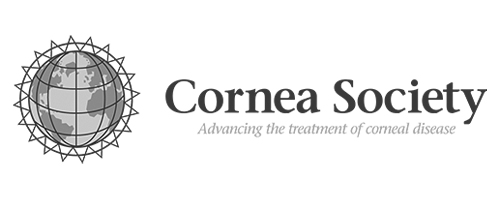

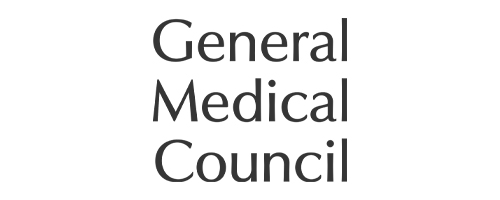
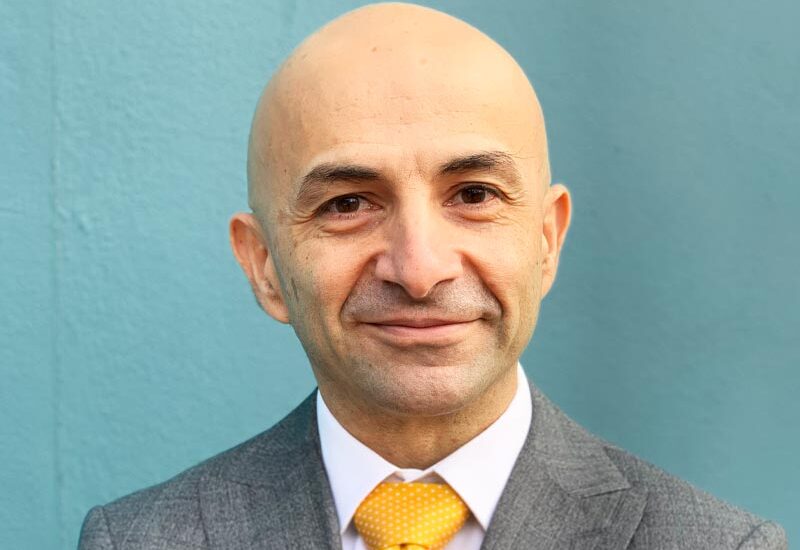
Prof Mohammed Muhtaseb, FRCOphth
Consultant Cornea, Cataract and Refractive Surgeon
Based in South Wales, he is one of the very few ophthalmologists working in the UK who is a fellowship-trained specialist in Cornea, Cataract and Refractive Surgery. He holds full specialist registration with the General Medical Council and was appointed as a Consultant in the NHS in 2006.
Learn more about eye conditions and eye treatments
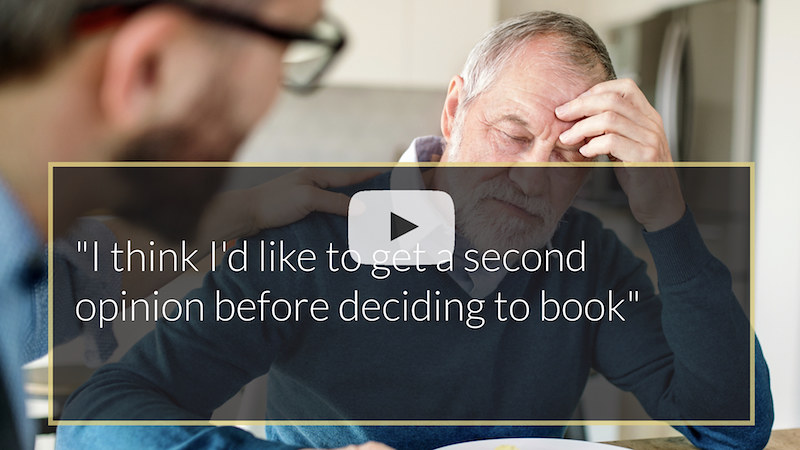
“I’d like to get a second opinion before deciding to book”
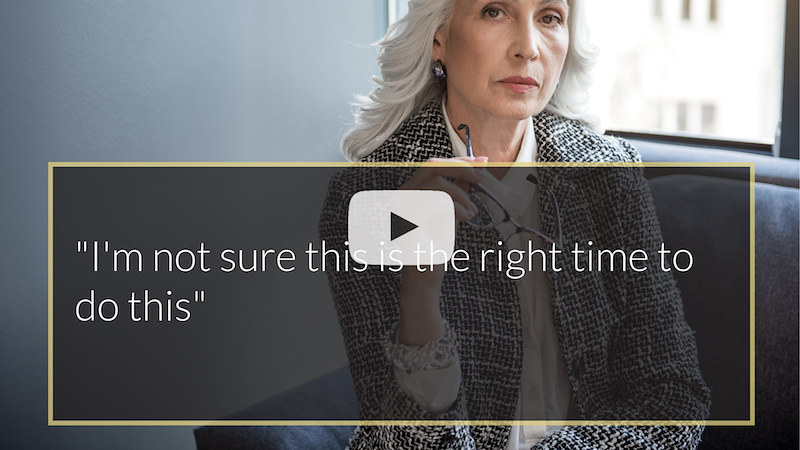
“I’m not sure this is the right time to do this”
